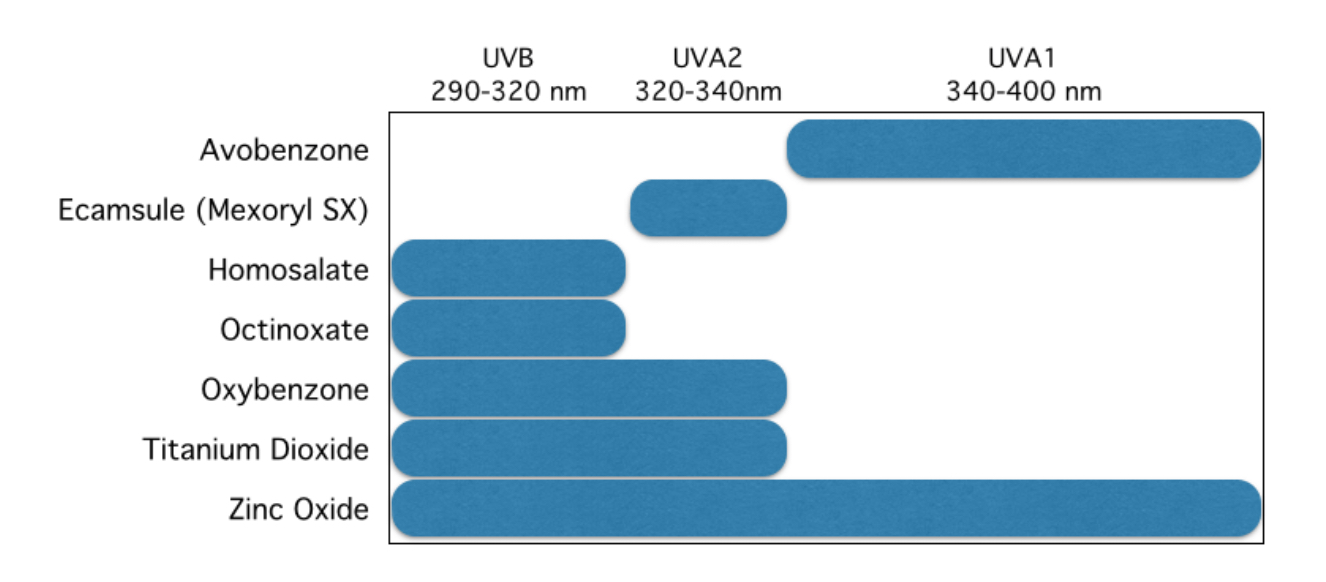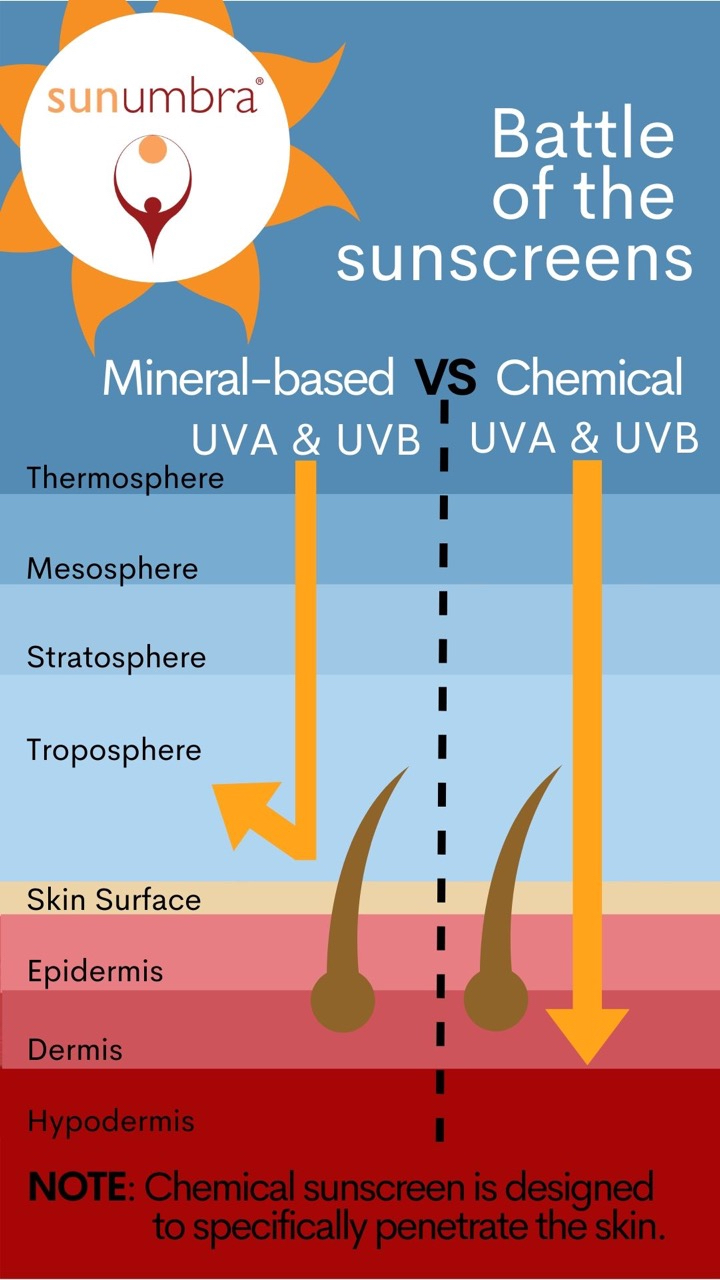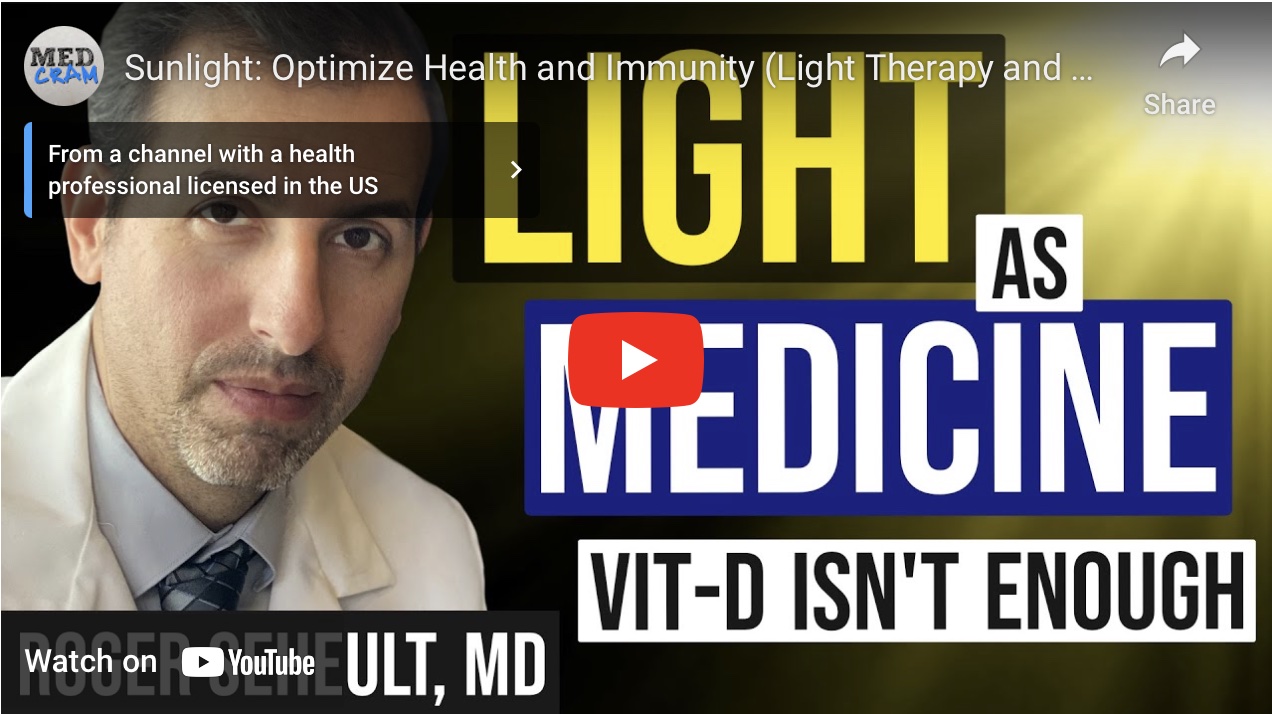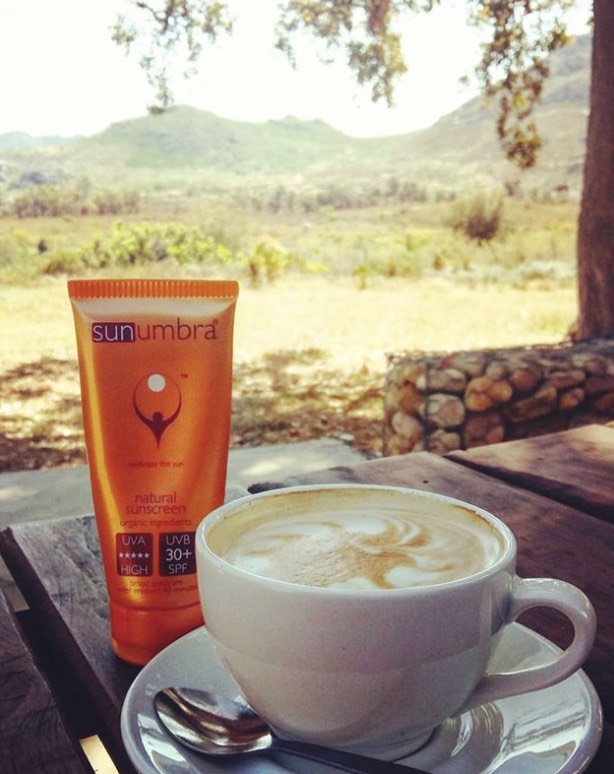What is the best sunscreen?
When I get asked what is the best sunscreen to use, I share how much we are increasingly being told that the choice should be for a mineral based sunscreen, which is a natural sunscreen as opposed to a synthetic chemical one.
This is a trend that has been steadily evolving over the past 10 years, but has been propelled upwards since COVID has alerted us globally to seek an increase in healthy living habits.
The real message in choosing natural is that you don't have to damage your skin with potentially toxic synthetic chemicals, when all you really wanted was to avoid getting sun burnt!
What is the best sunscreen ingredient choice
 sunscreen ingredients UV effectiveness
sunscreen ingredients UV effectivenessSunscreen formulas today use officially selected ingredients that are approved by various national health authorities across the globe.
These ingredients are either natural minerals (ie. physical) or synthetically created chemical ones. Formulas will use many different combinations of these chemical and/or physical sunscreens, using each ingredient within specified limits.
However, it is possible to use the zinc oxide mineral sunscreen ingredient only, up to a maximum of 25% of the formula. This is 100% natural, provides high level protection from both UVA and UVB rays for broad spectrum protection. The diagram above illustrates just how effective Zinc Oxide is across both UVA and UVB spectrums, in comparison to the other choices.
So sunscreens made using only zinc oxide and no other sunscreen active ingredients are becoming a key answer to what is the best sunscreen. The tricky part with using only zinc oxide, is to create a formula that does not leave your skin pasty white, as well as a consistency that applies easily and smoothly.
As demand has increased for zinc oxide only, so formulas have advanced too and we are finding these sunscreen options are far more plentiful than 10 years ago.
What is the best sunscreen - Natural vs Toxic Chemical
 Non toxic sunscreens are increasingly sought after
Non toxic sunscreens are increasingly sought afterProgressively over the past few years, the chemical sunscreens have been challenged through scientific studies that question the potential toxicity of them.
For those of us who like to inspect the ingredients on a label, the 'scientific-looking' ingredients tend to make consumers hesitate, as most of us lay people can't even pronounce the names, let alone understand what they are and how they affect our skin. Eg. Benzophenone-9 or in full, Sodium Dihydroxy Dimethoxy Disulfobenzophenone.
A healthy lifestyle is vital to combat the toxins encountered in our everyday living.
Choosing cosmetics with healthy ingredients and avoiding these toxic cosmetic ingredients is part of that lifestyle and choosing your best sunscreen means avoiding all below:
- Sodium Laurel, Lauryl Sulfate, or Sodium Laurel Sulfate: Combined with other chemicals this becomes Nitrosamine, a powerful carcinogen, which penetrates the skin’s moisture barrier, allowing chemicals in
- PEG (Polyethylene Glycol), Polysorbates, or Ethoxyylate alcohol: all contain dioxane, which is carcinogenic and probably one of the most potent toxins known to man
- Propylene Glycol: can cause dermatitis, kidney or liver abnormalities, skin growth prevention, or just plain irritation
- Phenol Carbolic Acid: Can cause circulatory collapse, paralysis, convulsions, coma, and even death from respiratory failure
- Acrylamide: Can cause breast cancer
- Toluene (Benzoic; Benzyl or Butylated Hydroxtoluene): can cause anemia, low blood cell count, liver and kidney damage and birth defects
Natural and organic preservatives do not damage your health.
Commonly used Parabens are endocrine disruptors mimicking oestrogen, upsetting hormone balance, plus are carcinogenic.
What is the best sunscreen that avoids chemicals
 Mineral vs chemical sunscreen dilemma
Mineral vs chemical sunscreen dilemmaThere is simply no need to damage your skin with chemicals to avoid getting sunburnt.
Rather choose zinc oxide as a mineral sunscreen, as it is 100% natural, provides high level protection for both UVA and UVB, plus has excellent healing qualities.
Reasons to avoid these chemical sunscreens:
- Octinoxate (Octyl Methoxycinnamate): gender bending (estrogenic)
- Oxybenzone (Benzophenone-3): allergic reactions and hormone disrupting
- Avobenzone (Butyl Methoxydibenzoylmethane): becomes toxic in sunlight!
- Octocrylene: potentially carcinogenic in itself
- Homosalate: Hormone disruptor; forms toxic metabolites
- Padimate O (Octyl Dimethyl Paba / Paba Ester): releases free radicals; damages DNA; estrogenic and allergic reactions
- Ensulizole (Phenylbenzimidazole Sulfonic Acid: potentially carcinogenic in itself
- Mexoryl SX: Degrades 40% in sunlight, produces reactive oxygen species
- Octyl Salicylate: Skin penetration enhancer; allows other chemicals into blood.
- Benzophenone (Sulisobenzone): irritates skin & eyes. Skin penetration enhancer.
Look for added healing ingredients for the best sunscreen
 Stunning Kigelia flower - increasingly popular ingredient for skin healing
Stunning Kigelia flower - increasingly popular ingredient for skin healingMany brands of natural sunscreen also include the use of botanical extracts and antioxidants that provide great benefits to the health of the skin and boost the body's own natural abilities to combat damage from the sun.
Many of these botanical extracts have delved into the use of plants through centuries of cultural tradition. Ancient cultural remedies are being tested in science laboratories and universities in various places in the world and the healing qualities of plants are being re-discovered in modern science. Eg. Kigelia extract is being used in many cosmetic creams for its remarkable skin healing qualities, having been used for many decades by various cultures where the tree grows.
So there is much benefit to be had by doing the homework and research to look for a natural sunscreen for best sunscreen protection, preferably with additional organic antioxidant ingredients for healing benefits.
What is the best sunscreen for the environment?
 Environmentally friendly sunscreens provide safe beaches and Safe Reefs.
Environmentally friendly sunscreens provide safe beaches and Safe Reefs.As environmental movements gain more momentum globally, many consumers are trading in their favourite products for more Earth-friendly versions. Increasingly the world is focusing on protecting the environment, knowing this will protect themselves plus generations to come.
All natural and organic items are quickly becoming more popular and sun care products are no exception.
All Natural sunscreen uses naturally occurring ingredients and properties that are gentle enough for sensitive skin, while effectively combating ultraviolet damage. Inevitably they are more gentle on the environment too.
Beyond an all natural sunscreen label, make they have:
- No synthetic, harsh chemicals
- No toxic preservatives
- No artificial colors
- No non-beneficial elements
- No toxic additives
Natural sunscreen formulas use a combination of zinc oxide and/or titanium dioxide but many remain skeptical about the use of titanium dioxide.
Studies have shown that the presence of titanium dioxide in humans can be potentially toxic. However, as nothing concrete enough has been clinically proven, legislation allows sun care manufacturers to continue to use this ingredient.
However, Reef Safe sunscreens do not allow for the use of any nano-sized zinc oxide or nano-sized titanium dioxide which is excellent.
Best choice for me is a sunscreen that only contains non-nano zinc oxide as the sun filter.
What is the best sunscreen that avoids all toxic cosmetic ingredients?
 Embracing all the goodness of being outdoors with nature
Embracing all the goodness of being outdoors with natureVarying mixtures of synthetically produced chemicals are contained in many cosmetics today.
The skin is the largest organ in our bodies and individual ingredients in the cosmetics will vary in their ability to penetrate it. Some will be absorbed in tiny amounts, while some reach the blood vessels and are transported around the body.
Although any one product may contain very small amounts of some of these synthetic ingredients, it is the cumulative effect of applying various products regularly that is causing concern.
Natural ingredients on the other hand are believed to support the skin. Being bioactive, they work with your skin, in the same way your natural oils do, because the chemicals found in plants are very similar to the chemicals found in your body.
The skin can therefore more easily recognise and work with the natural ingredients and make use of them in its constant effort to rebuild, regenerate and rejuvenate itself.
Allergies:
Some cosmetic ingredients have been linked in the media with various health scares and these have led some people to choose more pure, natural, or organic as safer alternatives. Commonly, people suffering from sensitive skin reactions or skin conditions like eczema or psoriasis, provide reports where organic skin care products used are shown to work far better. This is predominantly because they contain either no synthetic chemicals at all, or very small amounts.
For babies and growing children:
Parents tend to be more discerning in their choice of natural and organic, as developing bodies with young, tender skin are far more susceptible to synthetic chemicals and more likely to develop allergic reactions.
When you start to add all these things up, your health can pay a high price.
There are those that choose natural, organic cosmetic products simply to continue with a lifestyle choice to eat whole, pure organic food, and want to continue to support the positive benefits to themselves and the environment that their choices make.
However, choosing a natural sunscreen that is not only free of harmful chemicals or artificially produced substances, but one that provides your body with increased healing capabilities, can only benefit you!
So, take time to assess the best sunscreen and make sure it is not only protective but healing as well.
Have a question yourself?
Do you have a question or perhaps wish to make a comment or even tell a story about an experience with sunscreen? Please share it! Others will benefit and may join the conversation.







